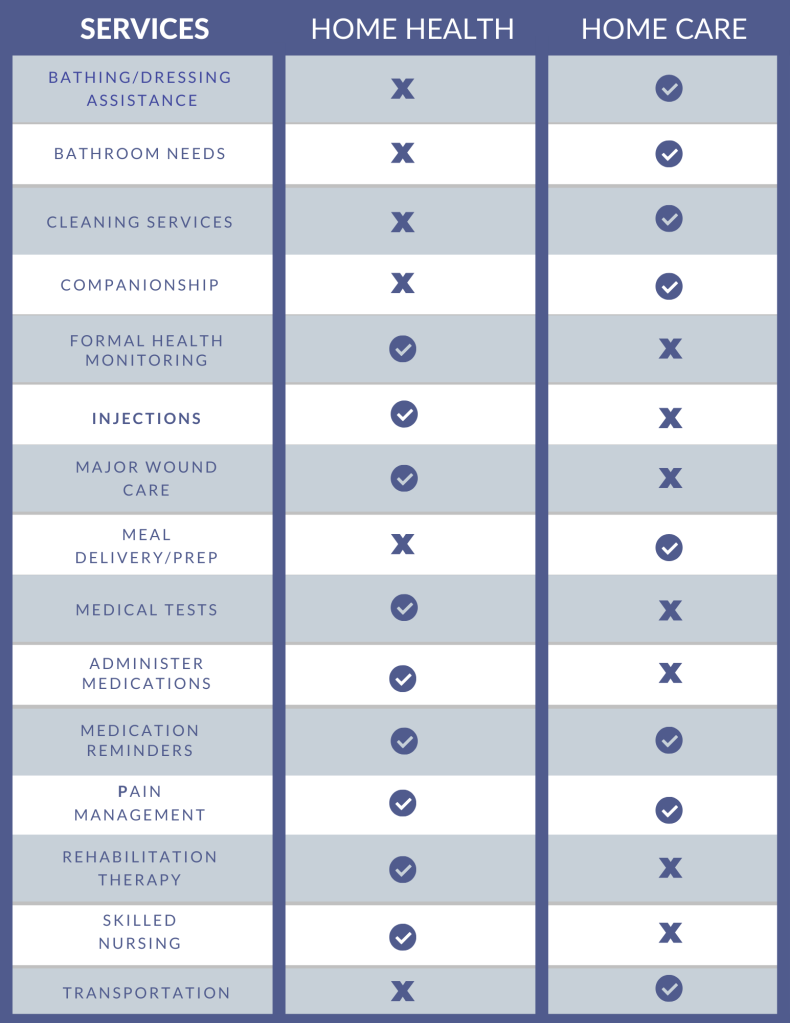Comparing (Home Care) Provider Services VS. Home Health Care
Home Health Care
Home Health Care is clinical, medical supervision provided by a licensed professional. Registered and licensed practical nurses, occupational therapists, and physical therapists can all provide home health care. This type of care is usually prescribed by a doctor following hospitalization or injury. It can include:
- Physical and occupational therapy
- Administration of prescription medications or shots
- Medical tests
- Monitoring of health status
- Wound care
Who benefits from home health?
- Seniors recently discharged from rehabilitation, a hospital stay, or a nursing facility
- Elderly people who need monitoring after a recent medication change
- Loved ones whose fragile health prevents them from safely traveling to and from doctors’ offices
- Seniors experiencing an overall decline in function who could benefit from occupational or physical therapy to regain independence
Provider (Home Care) Services
Provider or “Home Care” services are available for those who find it a challenge to execute the activities required in basic, day-to-day life. Without assistance, they would find themselves at risk for injury, malnourished, more prone to depression and may experience diminished mental, physical and/or emotional health without the support of a compassionate caregiver.
Home care services also include options, such as:
Companionship
Even those who enjoy living alone sometimes get lonely, and that loneliness intensifies if you’re housebound, let alone if you’re mostly chair- or bedbound. Companionship is one of the most requested home care services.
Within the “companionship” umbrella lives everything from attending social engagements together, playing cards, reading, listening to music, gardening, walking the dog, listening to stories, crafting, etc.
Medication Reminders
Memory lapses are normal as we age, even without dementia or Alzheimer’s. This is compounded for seniors who’ve been retired for a while because it’s easy to lose track of dates or days without a daily work routine.
While a home care aid cannot legally administer medications (that falls into the home health care department), they can remind seniors to take their meds as prescribed and call in/pick up medication refills.
General Housekeeping
Cleaning the house, changing sheets and doing laundry, watering plants, taking care of pets, reorganizing closets and cabinets so they’re more accessible, and more – general housekeeping services can help to conserve energies so seniors have more interest and stamina for more enjoyable activities and hobbies.
Regular house cleanings also ensure living conditions are safe and sanitary, that burned out light bulbs are replaced and that responsible parties are alerted when maintenance issues need to be addressed.
Grocery Shopping & Meal Prep
Cooking for one is rarely any fun. It also requires a lot of energy to prepare, cook and clean up. Add that to the fact that many seniors can’t get to the grocery store easily and you can see why malnourishment, bone density loss and weakening of muscles and joints is a risk for seniors who live alone or are not capable of preparing healthy meals.
Grocery and meal prep services ensure there are always healthy foods and snacks available, as well as delicious, easy-to-heat meals so seniors can have three square meals per day. Home care aids are also happy to keep clients company while they eat, which promotes better appetites.
Basic Hygiene
Basic hygiene is another thing that can slip by the wayside as one day fades into another, or if stiff joints or a fear of falling make it more difficult to get dressed or take regular showers.
A caregiver is happy to assist with these basic, daily necessities. Not only is it nice to be bathed and dressed, caregivers can also style hair, trim and file nails, put on accessories, etc., so seniors can feel like themselves again.
Combining Services
Often, families find that a combination of home health and provider care is beneficial for their loved one. Health professionals are able to provide medical services, while care aids assist with everyday activities. This holistic approach ensures that seniors’ emotional and medical needs are both met.
Paying for Services
As you know by now, home health generally falls under the umbrella of medical services, while provider care involves daily personal assistance. Insurance tends to cover these types of care accordingly:
- Medicare and private insurance plans cover home health when prescribed by a physician. This service is available to any senior who qualifies for Medicare.
- Medicaid covers both types of care for income-qualified seniors.
- Private Pay is common for provider care, but is only necessary for home health that hasn’t been ordered by a physician.
- Long-Term Insurance covers home care only if it’s included in your loved one’s plan. Check with their insurance agent for specifics.
Breaking It Down
Home health care and provider (home care) services are two separate ways to help aging relatives manage their health while providing them with a high-quality lifestyle. Home health care provides clinical services, whereas provider care provides non-clinical help with daily living. Understanding the difference can help you land the best-fit caregiver and determine the optimal way to pay for those services.
The chart below offers a general overview of the two types of care.
